|
|
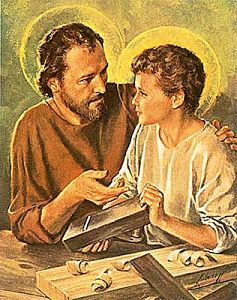 "What emanates from the figure of St. Joseph is faith. Joseph of Nazareth is a "just man" because he totally "lives by faith." He is holy because his faith is truly heroic. Sacred Scripture says little of him. It does not record even one word spoken by Joseph, the carpenter of Nazareth. And yet, even without words, he shows the depth of his faith, his greatness. St. Joseph is a man of great spirit. He is great in faith, not because he speaks his own words, but above all because he listens to the words of the Living God. He listens in silence. And his heart ceaselessly perseveres in the readiness to accept the Truth contained in the word of the Living God. We see how the word of the Living God penetrates deeply into the soul of that man, that just man. And we, do we know how to listen to the word of God? Do we know how to absorb it into the depths of our human personalities? Do we open our conscience in the presence of this word?" - Pope John Paul II from Daily Meditations
"What emanates from the figure of St. Joseph is faith. Joseph of Nazareth is a "just man" because he totally "lives by faith." He is holy because his faith is truly heroic. Sacred Scripture says little of him. It does not record even one word spoken by Joseph, the carpenter of Nazareth. And yet, even without words, he shows the depth of his faith, his greatness. St. Joseph is a man of great spirit. He is great in faith, not because he speaks his own words, but above all because he listens to the words of the Living God. He listens in silence. And his heart ceaselessly perseveres in the readiness to accept the Truth contained in the word of the Living God. We see how the word of the Living God penetrates deeply into the soul of that man, that just man. And we, do we know how to listen to the word of God? Do we know how to absorb it into the depths of our human personalities? Do we open our conscience in the presence of this word?" - Pope John Paul II from Daily MeditationsThe beautiful prayer below, composed by Saint Pope John XXIII (1958-63), places all workers under the patronage of St. Joseph the Worker, and asks for his intercession so that we may regard our work as a means of growing in holiness. Prayer to St. Joseph, as Patron of Workers..... Blessed St. Joseph, patron of all working people, obtain for me the grace to labor in a spirit of penance for the atonement of my many sins. Help me to be conscientious in my work so that I may give as full a measure as I have received. May I labor in a spirit of thankfulness and joy, ever mindful of all the gifts I have received from God that enable me to perform these tasks. Permit me to work in peace, patience, and moderation, keeping in mind the account I must one day give of time lost, talents unused, good omitted, and vanity of success, so fatal to the work of God. Glorious St. Joseph, may my labors be all for Jesus, all through Mary, and all after your holy example in life and in death. Amen. St. Joseph the Worker, pray for us! 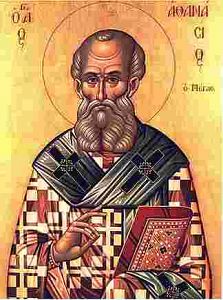 Bishop and Doctor of the Church
Bishop and Doctor of the Church296 - 373, Egypt St. Athanasius, a Bishop of Alexandria, was a great defender of the faith who fought against corrupt teachings his entire life. Persecuted by powerful secular and religious leaders of his day, Athanasius was exiled and deposed five times for defending Christianity's traditional teachings on the divinity of Jesus against the heresy of Arianism. He died at Alexandria in 373 AD after serving as bishop for 46 years. The strength and sustained value of his writings earned him the title of Doctor of the Church. During the time of St. Athanasius, the heresy of Arianism was increasing its sway over elite figures in society, including other bishops. The heresy of Arianism denies the divinity of Christ in favor of a view that Jesus was a creature created by God. But St. Athanasius maintained his vigorous and faithful defense of the traditional knowledge of Jesus as part of one God, unified in the Trinity with the Father and the Holy Spirit. Born of a Christian family in Alexandria, Egypt, and given a classical education, Athanasius was eventually elevated to bishop of Alexandria, where he led the fight against Arianism throughout the Church. Although Arianism was initially defeated at the Council of Nicaea and elsewhere, the heresy of Arianism began to attract followers in the ensuing years. Eventually, the First Synod of Tyre was convened against St. Athanasius by the Roman Emperor, who ultimately forced Athanasius into exile. Interventions by counsels and supporters of St. Athanasius would restore him as bishop, while his detractors would contrive to exile and depose him again and again. In total, Athanasius was exiled five times. In later years, multiple councils and synods would vindicate St. Athanasius's views and confirm his innocence. During periods of relative peace in his struggles, St. Athanasius wrote significant works on the ascetic ideal and important aspects of Christian theology. His writings in addition to his battles in defense of orthodoxy helped solidify him as a pillar of the Church for all time. St. Athanasius, pray for us! 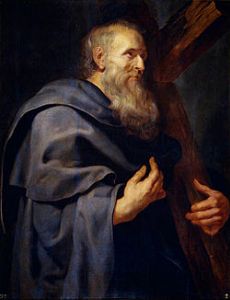 Born: Bethsaida, Palestine.
Born: Bethsaida, Palestine.Martyred: c. 80, at Hierapolis, Phrygia Disciple of St. John the Baptist. Convert. One of the Twelve Apostle. Brought St. Nathaniel to Christ. Confidant of Jesus. Little is known about him, but scriptural episodes give the impression of a shy, naive, but practical individual. Preached in Greece and Asia Minor. Martyr. Prayer.... O Glorious Saint Philip, at the Last Supper you said to Jesus, "Lord, show us the Father and it will be enough for us." Help us to make this our prayer also and to seek God in all things. Obtain for us the grace to know the Father and Jesus Christ whom he has sent - for in this does eternal life consist. Amen. St. Philip the Apostle, pray for us! 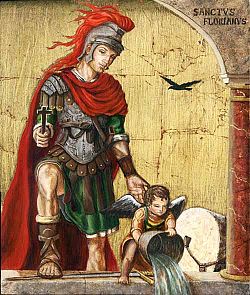 Martyred, 304
Martyred, 304Third century officer in Roman army stationed in modern Austria. Military administrator of the town of Noricum, and a closet Christian. Said to have stopped a town from burning by praying and throwing a single bucket of water on the blaze, and thus his association with firefighters and those who protect us from fire, including chimney sweeps. When ordered to execute a group of Christians during the persecutions of Diocletian, he refused, and professed his own faith. Martyr. Prayer for Firefighters and Paramedics.... Heavenly Father, I pray for the firefighters and paramedics of our nation. Thank You for their courage, dedication, and commitment in serving. I thank You for their bravery and willingness to sacrifice their own well-being and many times risk their own lives in the service of others. I pray for their protection. Keep them safe from harm and injury. Give them Your wisdom and guidance when faced with crucial decisions. Encourage and strengthen them mentally, physically, emotionally, and spiritually. Help them to overcome the stress and hardships that accompany their occupation. May Your blessings be upon their homes and families. Give their families peace, comfort, courage and strength to cope with the sacrifices that are required. I pray people everywhere would take time to pray for and personally give a word of encouragement and support to the rescue workers of their community. God bless all rescue workers! Amen. St. Florian, pray for us! 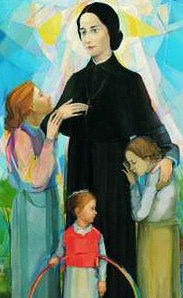 Born & Died in Bergamo, Italy. 1801-1857.
Born & Died in Bergamo, Italy. 1801-1857.Daughter of Giovanni Battista and Magherita Lanzani. Her mother died when Caterina was seven, and her father abandoned the girl and her younger sister Giuditta. They were accepted and grew up at the orphanage, the Conventino of Bergamo. There she developed a strong faith, a big sister's sense of responsibility, and a devotion to Our Lady and St. Jerome Emiliani. The sisters left the orphanage in 1823 to live with their cousins Giovanni and Antonio Cittadini, both parish priests at Calolzio, Italy. Caterina became a teacher at a girl's public school in Somasca in 1824. The sisters felt a call to the religious life; their spiritual director recommended that they should stay in Somasca, and become the basis of a new congregation. In 1826 the sisters rented a house in Somasca, bought and furnished a building, and in October opened a boarding school for girls. Caterina taught religion, managed the school, and instituted the oratory style of education for her girls. Word of her success spread, attracting more students. The sisters established another "Cittadini" private school in 1832, and another in 1836. Giuditta directed these new school until her sudden death in 1840. Caterini's cousin, Father Antonio Cittadini, died in 1841, followed quickly by the death of her spiritual director from the orphanage. The rapid succession of tragedy ruined Caterina's health, and she fell gravely ill;she was cured through the intercession of St. Jerome Emiliani. Caterina quit her public teaching position in 1845 to manage the schools, care for the orphans, and guide the three companions who helped her. To help organize the work and lives of her companions, she wrote the beginnings of a new rule similar to that of other religious orders. In 1850 she obtained permission to build a private oratory to keep the Blessed Sacrament at her boarding school. In 1851 she applied for approval of her new religious family. In 1854 her bishop encouraged her work, and told her to write the rules of the new order; her first attempt, based on the Constitution of the Ursulines of Milano was rejected. A second attempt was accepted on 17 September 1854 under the title Orsoline Gerolimiane (Ursuline Sisters of Somasca). On 14 December 1857, a few months after her death, the bishop of Bergamo gave his approval; the order achieved papal recognition on 8 July 1927. The order's mandate is to teach, and to care for the abandoned. Today they work in Italy, Switzerland, Belgium, Brazil, Bolivia, India, and the Philippines. "Left an orphan at a very tender age, she became an affectionate mother to orphans. She wanted her spiritual daughters to be 'mothers' in schools and in contact with children. The secret was union with the Eucharist." - Pope John Paul II Blessed Caterina Cittidini, pray for us! 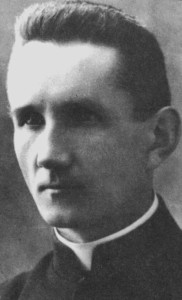 Born 1888, Bierzwiennej, Wielkopolskie, Poland.
Born 1888, Bierzwiennej, Wielkopolskie, Poland.Gassed on May 6, 1942 in the concentration camp at Dachau, Bavaria, Germany. Beatified, June 13, 1999 by Pope John Paul II at Warsaw, Poland. Priest. Rector of the major seminary of Wloclawek, Poland. Arrested in 1939 during the Nazi persecutions, he kept his faith and ministered to other prisoners in the camps. Blessed Henryk Kaczorowski, pray for us! 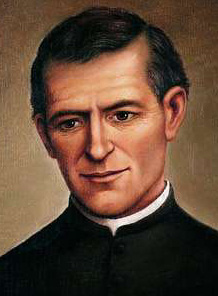 Italian. 1818-1902.
Italian. 1818-1902.Born to a poor farming family, Agostino spent his youth as a mountain shepherd, using his solitary time for prayer. During a parish mission in May 1835, he realized a call to the priesthood, a calling he approached with prayer which led to financial aid that allowed him to study at Genoa, Italy. Ordained on September 19, 1846. Priest at Saint Martin d'Albaro in 1846, then the Church of Consolation in Genoa in 1854. Chaplain of the provincial orphanage in 1874, a post he held for 22 years. Prison chaplain, working especially with prisoners condemned to death. He established a residential school to train young women who were in danger of starvation or falling into prostitution because they had no support. On October 15, 1876, he founded the Institute of Sisters of the Immaculata to run this and other residential centers he established. From Pope John Paul II's homily at the canonization of Agostino Roscelli, 10 June 2001. 'Great is his love for us.' The love of God for men is manifested with particular clarity in the life of St. Augustine Roscelli, whom we contemplate today in the splendor of holiness. Its existence, all imbued with deep faith, can be considered a gift offered to the glory of God and for the good of souls. It was the faith to make it always obedient to the Church and its teachings, in docile adherence to the Pope and to their own bishop. By faith he knew how to draw comfort in sad, in the harsh difficulty, and in painful events. Faith was the solid rock to which he held on tightly to not give in to discouragement. This same faith felt it his duty to communicate to others, especially to those who approached the ministry of confession. He became a master of the spiritual life, especially for the sisters that he founded, which saw him serene even in the most trying situations. St. Augustine Roscelli exhorts us always to trust in God, immersing us in the mystery of his love. St. Agostino Roscelli, pray for us!  1774 - 1835
1774 - 1835Canonized By: Pope John Paul II Foundress of the Daughters of Charity at Verona, Italy. Born in 1774, she was the daughter of the Marquis of Canossa, who died when Maria Magdalen was three. Her mother abandoned the family, and Maria Magdalen managed her father's estate until she was thirty-three, then founding her institute. When she died, her Daughters of Charity were widespread. She was canonized in 1988 by Pope John Paul II. "Above all make Jesus known. Jesus is not loved because he is not known." St. Magdalene of Canossa St. Magdalene of Canossa, pray for us! 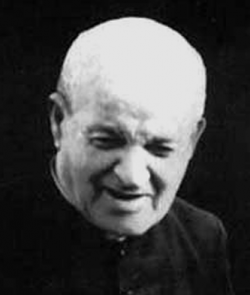 Born: 1880 in Valletta, Malta
Born: 1880 in Valletta, MaltaDied: 1962 in Santa Venera, Malta Beatified: 2001 by Pope John Paul II, his beatification miracle involved the healing of an irreversibly detached retina of a member of the Society. Canonized: 2007 Pope Benedict XVI Seventh in a Christian family of nine children, the son of Vincent Preco and Nathalie Ceravolo. His father was a merchant and health inspector. George was a sickly child. Studied at the Lyceum and Major Seminary on Malta. A severe respiratory ailment in seminary nearly killed him, but he recovered through the intercession of Saint Joseph. While still a student, he began writing a Rule in Latin for use in a planned society of Permanent Deacons. Ordained 22 December 1906. After ordination he modified his concept of the society. He began teaching along the waterfront, working with the roughest of men. He gathered a group of young male catechists, including the Servant of God Ewgenju Borg, and they formed the beginning of the Society of Christian Doctrine at Hamrun, Malta in 1907. The Society's motto is represented by the letters M.U.S.E.U.M.: Magister Utinam Sequator Evangelium Universus Mundus! (Master, that the whole world would follow the Gospel!, and were dedicated to bringing the Bible and theology to lay people and the working classes. Educating the working class was so revolutionary that Father George was accused of insanity, and was once ordered to shut down his operation. He caused more uproar with his plan to educate lay men and women, and send them out to proclaim God's word anywhere that would listen. Society catechist centers opened in many parishes, teaching young and old, and giving children a place to stay out of trouble. Their teaching brought a deeper understanding of the faith to people who simply went through the motions of devotions, often without knowing why. The bishop of Malta approved the Society and its Rule in 1932. Father Preca taught and wrote in Maltese, the language of the common people. From leaflets to books, George published approximately 150 works. He had a special devotion to the Mystery of Incarnation. Popular preacher, sought after confessor, and believed to have been a miraculous healer. The Society continues its work today with Centres in Malta, Australia, Sudan, Kenya, Peru, Great Britain, and Albania. 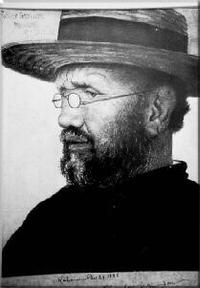 Born on a family farm at Tremeloo, Belgium in 1840.
Born on a family farm at Tremeloo, Belgium in 1840.Died in 1889 at Molokai, Hawaii from leprosy. Son of a small farmer. Studied at the college at Braine-le-Comte, Belgium. Joined the Picpus Fathers in 1860, taking the name Damien. Seminarian in Paris, France. Volunteered for missionary work while still in seminary, and was sent to Hawaii. Ordained in Honolulu in 1864. Missionary on islands where his single parish was the size of all of his native Belgium. Resident priest in the leper colony on Molokai where for years he worked alone to minister to the patients' spiritual and medical needs. His work turned a wretched dump for the unwanted into a real community with the best treatment of the day, and patients who lived strong spiritual lives. He contracted leprosy in 1885, and though severely crippled by the disease, Father Damien worked until the end. Prayer to St. Damien of Molokai.... St. Damien, brother on the journey, Happy and generous missionary, who loved the Gospel more than your life, who for love of Jesus left your family, your homeland, your security, your dreams, Teach us to give our lives with a joy like yours, to be in solidarity with the outcasts of the world, to celebrate and contemplate the Eucharist as the source of our commitment. Help us to love to the very end and, in the strength of the Spirit, to persevere in compassion for the poor and forgotten so that we might be good disciples of Jesus and Mary. Amen. St. Damien of Molokai, pray for us!  God our Creator, we pray....
God our Creator, we pray....for new mothers, coming to terms with new responsibility; for expectant mothers, wondering and waiting; for those who are tired, stressed or depressed; for those who struggle to balance the tasks of work and family; for those who are unable to feed their children due to poverty; for those whose children have physical, mental or emotional disabilities; for those who have children they do not want; for those who raise children on their own; for those who have lost a child; for those who care for the children of others; for those whose children have left home; and for those whose desire to be a mother has not been fulfilled. Bless all mothers, that their love may be deep and tender, and that they may lead their children to know and do what is good, living not for themselves alone, but for God and for others. Amen. Mary, Mother of God and of all Mothers, pray for us! 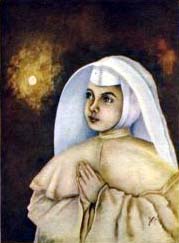 1322-1333, Bologna, Italy.
1322-1333, Bologna, Italy.Blessed Imelda was born in 1322 in Bologna, the only child of Count Egano Lambertini and Castora Galuzzi. Her parents were devout Catholics and were known for their charity and generosity to the underprivileged of Bologna. On her fifth birthday, she requested to receive Holy Eucharist; however the custom at the time was that children did not receive their First Holy Communion until age 14. At age nine, she went to live with the Dominican nuns at Val di pietra, near Bologna. On May 12, 1333, the day of the vigil of the Ascension, she knelt in prayer and the "Light of the Host" was reportedly witnessed above her head by the Sacristan, who then fetched the priest so he could see. After seeing this miracle, the priest felt compelled to admit her to receiving the Eucharist. Immediately after receiving it, Imelda went back to her seat, and decided to stay after mass and pray. Later when a nun came to get Imelda for supper, she found her still kneeling with a smile on her face. The nun called her name, but she did not stir, so she lightly tapped Imelda on the shoulder, at which Imelda collapsed to the floor dead. Her remains are kept in Bologna at the Church of San Sigismondo, beneath the wax effigy of her likeness. Blessed Imelda was beatified by Pope Leo XII in 1826. Prayer... Lord Jesus Christ, you received into heaven Blessed Imelda who loved you in the Eucharistic banquet. By her prayers may we learn to approach your holy table with that same fervent love and so fulfill our longing to be with you, who live and reign with the Holy Spirit, one God, for ever and ever. - General Calendar of the Order of Preachers 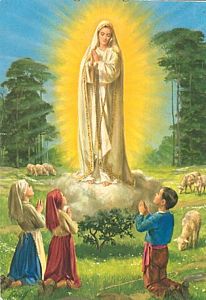 Our Lady of Fatima is a title for the Virgin Mary due to her apparitions to three shepherd children at Fatima, Portugal on the thirteenth day of six consecutive months in 1917, beginning on May 13. The three children were Lucia Santos and her cousins Jacinta and Francisco Marto.
Our Lady of Fatima is a title for the Virgin Mary due to her apparitions to three shepherd children at Fatima, Portugal on the thirteenth day of six consecutive months in 1917, beginning on May 13. The three children were Lucia Santos and her cousins Jacinta and Francisco Marto.Prayer to Our Lady... Queen of the Rosary, sweet Virgin of Fatima, who has deigned to appear in the land of Portugal and has brought peace, both interior and exterior. Bring back peace to all nations of the world, so that all, and our own nation in particular, may be happy to call you their Queen and the Queen of Peace. Our Lady of the Rosary, pray for our country. Our Lady of Fatima, obtain for all humanity a durable peace. Amen. 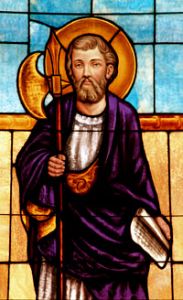 Apostle, stoned to death at Colchis in 80.
Apostle, stoned to death at Colchis in 80.As St. Matthias could bear witness to the Resurrection of Jesus, he was chosen to replace Judas Iscariot. He preached the Gospel for more than 30 years in Judea, Cappadocia, Egypt and Ethiopia. Martyr. Prayer to St. Matthias the Apostle.... O Glorious Saint Matthias, in God's design it fell upon you to take the place of the unfortunate Judas who betrayed his Master. You were selected by the twofold sign of the uprightness of your life and the call of the Holy Spirit. Obtain for us the grace to practice the same uprightness of life and to be called by that same Spirit to wholehearted service of the Church. Then after a life of zeal and good works let us be ushered into your company in heaven to sing forever the praises of Father, Son, and Holy Spirit. Amen. St. Matthias the Apostle, pray for us! 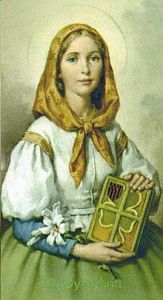 7th Century
7th CenturyDaughter of a pagan Irish king named Damon, and a beautiful devoted Christian woman whose name has not come down to us. Her mother died when Dymphna was a teenager. Her father searched the Western world for a woman to replace his wife, but none could. Returning home, he saw that his daughter was as beautiful as her mother, and maddened by grief, he made advances on her. She fought him off, then fled to Belgium with St. Gerebernus, an elderly priest and family friend. Dymphna's father searched for them, and his search led to Belgium. There an innkeeper refused to accept his money, knowing it was difficult to exchange. This told Damon that his daughter was close - it would be unusual for a village innkeeper to know a lot about foreign currency, and his knowledge indicated that he had recently seen it. The king concentrated his search in the area. When he found them in Gheel, he beheaded Gerebernus, and demanded that Dymphna surrender to him. She refused, and he killed her in a rage. The site where she died is known for its miraculous healings of the insane and possessed. There is now a well-known institution on the site, and her relics are reported to cure insanity and epilepsy. Prayer.... Lord God, Who has graciously chosen Saint Dymphna to be the patroness of those afflicted with mental and nervous disorders, and has caused her to be an inspiration and a symbol of charity to the thousands who invoke her intercession, grant through the prayers of this pure, youthful martyr, relief and consolation to all who suffer from these disturbances, and especially to those for whom we now pray. (Here mention those for whom you wish to pray.) We beg You to accept and grant the prayers of Saint Dymphna on our behalf. Grant to those we have particularly recommended patience in their sufferings and resignation to Your Divine Will. Fill them with hope and, if it is according to Your Divine Plan, bestow upon them the cure they so earnestly desire. Grant this through Christ Our Lord. Amen. St. Dymphna, pray for us!  English. Born: 1165 in Aylesford, County Kent, England.
English. Born: 1165 in Aylesford, County Kent, England.Died: 1265 in the Carmelite Monastery at Bordeaux, France. Itinerant preacher. Pilgrim to the Holy Lands, but left when invading Muslims chased out Christians. Joined the Carmelite Order soon after its arrival in England. Simon lived and studied for several years in Rome, Italy and Mount Carmel. Elected sixth general of the Carmelites in 1247 around age 82. He helped the Order spread through England, southern and western Europe. Founded houses in Cambridge, England in 1248, Oxford in 1253, Paris, France in 1260, and Bologna, Italy in 1260. Revised the Rule of the Order to make them mendicant friars instead of hermits. Regardless of these successes, the Order was oppressed on all sides, including by the clergy and other orders. The friars took their woes to their patroness, the Virgin Mary. On 13 January 1252 the Order received a letter of protection from Pope Innocent IV, protecting them from harassment. On May 16, the Catholic Church remembers Saint Simon Stock as the Carmelite monk whose vision of the Virgin Mary is the source of the Brown Scapular devotion. Carmel's Flower, Vine ever blossoming, Heaven's splendor! Virgin who bore a child. No one is like thee. Mother gentle and kind. Yet never touched by man! To Carmelites give thou the privilege. Help us Star of the Sea. - Simon Stock St. Simon Stock, pray for us!  Born on the Feast of Pentecost, 1540 in Spain
Born on the Feast of Pentecost, 1540 in SpainDied on the Feast of Pentecost, 1592. Son of the pious peasants Martin Baylon and Elizabeth Jubera. From youth he displayed great devotion to the Eucharist. Worked as a shepherd from ages 7 to 24, and was a good influence on his shepherds friends, an often rowdy group. Franciscan lay brother with friars of the Alcantarine Reform, often serving as cook or doorkeeper. His charity to the poor and afflicted, his unfailing courtesy and humility were remarkable even by Franciscan standards. While traveling in France, he defended the Real Presence against the blasphemies of a Calvinist preacher, and narrowly escaped death at the hands of a Huguenot mob. Poorly educated, he was still a counselor sought by rich and poor alike. "Meditate well on this: Seek God above all things. It is right for you to seek God before and above everything else, because the majesty of God wishes you to receive what you ask for. This will also make you more ready to serve God and will enable you to love him more perfectly." - St. Paschal Baylon St. Paschal Baylon, pray for us! 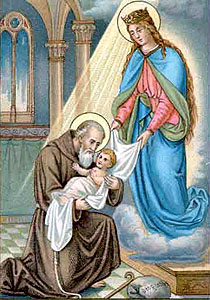 1515, Abruzzi, Italy. Died 1587 in Rome.
1515, Abruzzi, Italy. Died 1587 in Rome.Having little education, he had a friend read him the lives of the early Desert Fathers; they left him torn - he wanted to live as a hermit, but feared he would give in to temptation if he had no superior. He sought entrance to the Capuchins; they were hesitant, but finally accepted him as a lay brother in 1543 at Anticoli near Rome. Sent to Rome in 1547 as questor for the community; he stayed there the rest of his life. Felix's reputation for holiness spread quickly. He could not even read, yet theologians consulted him on spirituality and Scripture. Sinners on the street would hide from him when it became obvious he could see their sins, and knew their hearts. Felix preached in the street, rebuked corrupt politicians and officials, and exhorted young men to stop leading dissolute lives. Once during Carnival, a time of open vice in the streets, Felix and St. Philip Neri organized a procession of Capuchin friars right into the middle of the revelers; Fra Lupo, a well-known Capuchin preacher, spoke to the crowds, and Carnival ended for the year. Felix worked with the children of Rome; his inherent simplicity and lack of education made him rather childlike, and children trusted him. He composed simple teaching canticles, and had the children gather in groups to sing them as a way to teach them catechism. The canticles became well-known and popular, and while Felix was begging for his house, Roman citizens would invite him in to sing for them; he saw these invitations as opportunities to teach, and always jumped at them. During the famine of 1580, the city fathers asked the Capuchins for the loan of Felix as a fund raiser; he was tireless in the work. His friend, St. Philip Neri, considered Felix the greatest saint then living. St. Charles Borromeo sought St. Philip's help to draw up the constitutions of the Oblates of St. Ambrose; Philip referred him to Felix as a the best advisor. Slept little, ate what came to hand, attended Mass every morning. Had a great devotion to Our Lady; he frequently recited the rosary, sometimes swept away in ecstasy, unable to finish the prayers. Received a vision of the Virgin Mary during which he was allowed to hold the Christ Child in his arms. Acclaimed a saint by the people of Rome immediately after his death. St. Felix of Cantalice, pray for us! 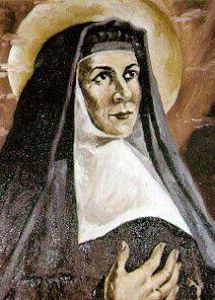 Born: 16 April 1783 in Barcelona, Spain
Born: 16 April 1783 in Barcelona, SpainDied: 1854 of cholera Beatified: 19 May 1940 Canonized: 12 April 1959 by Pope John XXIII Married to the Spanish nobleman Theodore de Mas in 1799. Mother of nine children. Widowed in 1816. Founded the Institute of the Carmelite Sisters of Charity in 1826. The Institute spread through Catalonia with the mission of caring for the sick, and teaching children. Had a great devotion to the mystery of the Holy Trinity. Suffered a slow paralysis during the last four years of her life. Prayer..... Lord God, you gave St Joachina de Vedruna to your Church for the Christian education of youth and the care of the sick. May we follow her example, and lovingly devote our lives to serving you in our brothers and sisters. Grant this through Christ, our Lord. Amen. St. Joaquina, pray for us! 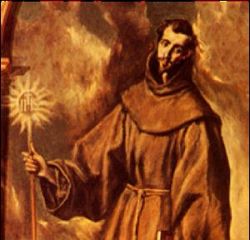 Italian. 1380-1444
Italian. 1380-1444Friar Minor. Priest. Itinerant preacher. Theological writer. His preaching skills were so great, and the conversions so numerous, that he has become associated with all areas of speaking, advertising, public relations, etc. Bernardine's charismatic preaching filled the piazza of Italian cities. Thousands of listeners flocked to hear him and to participate in dramatic rituals, which included collective weeping, bonfires of vanities, and exorcisms. He was a renowned peacemaker, in the Franciscan tradition, who tried to calm feuding clans and factions in the turbulent political world of the Renaissance. His preaching visits would often culminate in mass reconciliations, as listeners were persuaded to exchange the bacio di pace, or kiss of peace. Bernardine was sensitive to the demands of secular life, and tried to negotiate between Christian ethics and a conflicting code of honor that stressed retaining face in a public world. He argued that the catalyst of civil discord in the urban setting was malicious gossip, which led to insults, and, too often, vendetta by aggressive males. His surprising allies in his peace keeping mission were the women who comprised the majority of his audience. "Jesus, Name full of glory, grace, love and strength! You are the refuge of those who repent, our banner of warfare in this life, the medicine of souls, the comfort of those who morn, the delight of those who believe, the light of those who preach the true faith, the wages of those who toil, the healing of the sick. To You our devotion aspires; by You our prayers are received; we delight in contemplating You. O Name of Jesus, You are the glory of all the saints for eternity. Amen." ~ St. Bernardine of Siena St. Bernardine of Siena, pray for us! 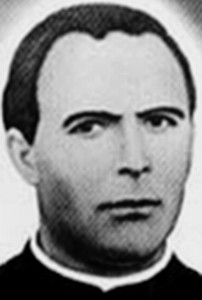 Born: 1877, Spain
Born: 1877, SpainMartyred: 1924, Brazil Ordained in 1902 in the Archdiocese of Braga, Portugal. Transferred to the diocese of Frederico Westphalen, Brazil in 1913. Known as a concerned pastor to his flock, and for his social work in the region. While on a missionary journey, Fr. Emmanuel and his faithful acolyte, Adilo, were shot to death by revolutionaries. Prayer... "Bl. Emmanuel and Bl. Adilo, grant us your help, which we also recognize today as powerful, and offer us from Heaven your intercession at the throne of the Most High. May he turn his gaze upon our wretchedness and our needs, our conflicts and the hatred that devastates the human heart, oppresses the weak and stifles his grace! May the Prince of Peace sustain the battle of his Church and descend among our ranks so that his Word may be triumphant, and may the Blessed Martyrs Emmanuel and Adilo intercede for us so that one day we may with them sing praise to the Lord, where Christ reigns in glory among the heavenly hosts! The power and the glory are his, now and for ever. Amen!" Blessed Emmanuel, pray for us! 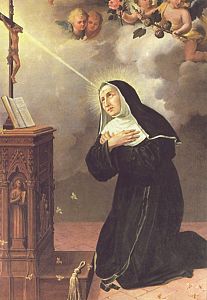 1386, Umbria, Italy
1386, Umbria, Italy1457, Cascia, Italy Born at Roccaporena in central Italy, Rita wanted to become a nun but was pressured at a young age into marrying a harsh and cruel man. During her 18-year marriage, she bore and raised two sons. After her husband was killed in a brawl and her sons had died, Rita tried to join the Augustinian nuns in Cascia. Unsuccessful at first because she was a widow, Rita eventually succeeded. Over the years, her austerity, prayerfulness and charity became legendary. When she developed wounds on her forehead, people quickly associated them with the wounds from Christ's crown of thorns. She meditated frequently on Christ's passion. Her care for the sick nuns was especially loving. She also counseled lay people who came to her monastery. Beatified in 1626, Rita was not canonized until 1900. She has acquired the reputation, together with St. Jude, as a saint of impossible cases. Many people visit her tomb each year. Prayer.... Dear Rita, model Wife and Widow, you yourself suffered in a long illness showing patience out of love for God. Teach us to pray as you did. Many invoke you for help, full of confidence in your intercession. Deign to come now to our aid for the relief and cure of {name of sufferer}. To God, all things are possible; may this healing give glory to the Lord. Amen. St. Rita, pray for us! 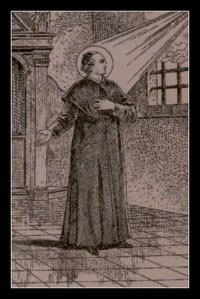 1698-1764
1698-1764John Baptist de Rossi was born in a village near Genoa, Italy to Charles de Rossi and Frances Anfossi. He was one of four children and his family loved him. They were proud when a wealthy couple visiting their town offered to educate him. His parents knew the couple and trusted them. John was happy to be able to go to their house in Genoa because he could attend school. He then met some Capuchin friars who became fond of him and helped him continue his education in Rome. He became a student for the priesthood at the Roman College run by Jesuit priests. He realized that studies were easy for him and took on more and more of a load. John became very sick and had to stop his studies for a while. Sometime later he completed his preparation and became a priest. Even though his health was always poor, Father John did so much good for the people of Rome. He knew what it was like not to feel well, so Father Rossi took a special interest in sick people. He was a frequent visitor in Rome's hospitals. He especially loved to spend time with the poor people at the Hospice of St. Galla. This was a shelter for the poor and homeless. But Father Rossi became aware of poor people who had no one to look after their spiritual needs. He noticed those who brought cattle and sheep to sell in the Roman markets and what hard lives they had. They came in the morning with their herds. Father Rossi would walk among them and stop and talk with them. When possible, he would teach them about the faith and offer them the sacrament of Reconciliation. Father Rossi's priestly ministry made a big difference in their lives. The priest also felt deep compassion for the homeless women and girls. They wandered through the streets day and night begging. This was dangerous and very sad. The pope gave Father Rossi money to open a shelter for homeless women. It was right near the Hospice of St. Galla. Father Rossi placed the house under the protection of one of his favorite saints, Aloysius Gonzaga. Father Rossi became best known for his kindness and gentleness in confession. People formed lines near his confessional and waited patiently for their turn. He once said to a friend that the best way for a priest to reach heaven was to help people through the sacrament of Reconciliation. Another favorite job he was given by Pope Benedict XIV was to teach Catechism to prison and government officials, including the public hangman. Father Rossi suffered a stroke in 1763 and did not get better again. He was able to celebrate Mass but he suffered greatly. This wonderful priest died at the age of sixty-six. It was May 23, 1764. -excerpt from one of St. John Baptist de Rossi's sermons to his fellow priests: "Ignorance is the leprosy of the soul. How many such lepers exist in the church here in Rome, where many people don't even know what's necessary for their salvation? It must be our business to try to cure this disease. The souls of our neighbors are in our hands, and yet how many are lost through our fault? The sick die without being properly prepared because we have not given time or care enough to each particular case. Yet with a little more patience, a little more perseverance, a little more love, we could have led these poor souls to heaven." St. John Baptist de Rossi, pray for us! 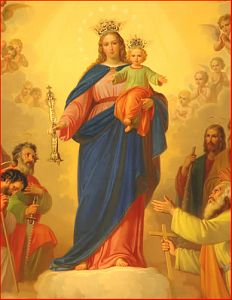 The tradition of the title of Mary, Help of Christians, dates back to 1571 when Christianity was saved through the intercession of the Blessed Mother during the now famous battle of Lepanto. It was in this battle--on October 7, later declared as the Feast of Our Lady of the Holy Rosary-- that Christian forces were victorious over Muslim invaders, believed to be due to the continuous Rosary prayers of Christians throughout Europe. Tradition tells us that following the decisive battle, many Christian soldiers marched to Loreto, where then invoked Mary, Our Blessed Mother, as the "Help of Christians." Following that invocation, devotion to Mary under this title spread.
The tradition of the title of Mary, Help of Christians, dates back to 1571 when Christianity was saved through the intercession of the Blessed Mother during the now famous battle of Lepanto. It was in this battle--on October 7, later declared as the Feast of Our Lady of the Holy Rosary-- that Christian forces were victorious over Muslim invaders, believed to be due to the continuous Rosary prayers of Christians throughout Europe. Tradition tells us that following the decisive battle, many Christian soldiers marched to Loreto, where then invoked Mary, Our Blessed Mother, as the "Help of Christians." Following that invocation, devotion to Mary under this title spread.Centuries later, in 1809, the army of Napoleon Bonaparte, rampaging across Europe, stormed the Vatican and arrested then Pope Pius VII. The pope, was chained, brought to Grenoble, and later Fontainebleau where he would remain imprisoned for more than five years. During his imprisonment, Pope Pius VII smuggled a message from his cell, urging Christians everywhere to pray to Mary, Help of Christians, for the defeat of Napoleon and restoration of the Church. In 1814, Napoleon was defeated, and the Pius VII returned, triumphant to Rome, giving thanks to the Lord and the Blessed Virgin for his release. At that time, he decreed that the Feast of Mary, Help of Christians, would be celebrated on May 24. Devotion spread across the Church, throughout the world. Furthering the devotion to Mary, Help of Christians, was Saint John Bosco (1815-1888), priest and founder of the Salesian Order and the Daughters of Mary, Help of Christians. A prophetic dreamer, Saint John Bosco foresaw the difficult times ahead that the Church would face. In one such dream, he witnessed the future pope anchoring the 'ship,' the Church, between two pillars--one with a statue of Mary, Help of Christians, the other with a large Eucharistic host. He wrote to his order, saying, "The principal objective is to promote veneration of the Blessed Sacrament and devotion to Mary Help of Christians. This title seems to please the Queen of Heaven very much." He stated, "If you want to see miracles, have devotion to Mary, Help of Christians." Saint John Bosco dedicated his entire order to her invocation, and upon his deathbed stated, "The help of God and of Mary will not fail you...I recommend devotion to Mary Help of Christians and frequent Holy Communion." Prayer... Most Holy and Immaculate Virgin, Help of Christians, we place ourselves under your motherly protection. Throughout the Church's history you have helped Christians in times of trial, temptation and danger. Time and time again, you have proven to be the Refuge of sinners, the Hope of the hopeless, the Consoler of the afflicted, and the Comforter of the dying. We promise to be faithful disciples of Jesus Christ, your Son, to proclaim His Good News of God's love for all people, and to work for peace and justice in our world. With faith in your intercession, we pray for the Church, for our family and friends, for the poor and abandoned, and all the dying. Amen. Mary, Help of Christians, pray for us! 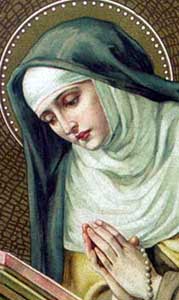 Born: 1566 in Florence, Italy
Born: 1566 in Florence, ItalyDied: 1607 Catherine received a religious upbringing. She was initially sent to a convent at age 14, but was taken back home by her family who opposed her religious vocation and wanted her to marry well. They eventually gave in, and Catherine became a Carmelite of the Ancient Observance at 16, taking the name Sister Mary Magdalen. Mystic. Led a hidden life of prayer and self-denial, praying particularly for the renewal of the church and encouraging the sisters in holiness. "Come, Holy Spirit. Spirit of truth, you are the reward of the saints, the comforter of souls, light in the darkness, riches to the poor, treasure to lovers, food for the hungry, comfort to those who are wandering; to sum up, you are the one in whom all treasures are contained. Come! As you descended upon Mary that the Word might become flesh, work in us through grace as you worked in her through nature and grace. Come! Food of every chaste thought, fountain of all mercy, sum of all purity. Come! Consume in us whatever prevents us from being consumed in you." - from the writings of Saint Mary Magdalen de Pazzi St. Mary Magdalen de Pazzi, pray for us!  Memorial Day was first observed on May 30, 1868, when flowers were placed at the graves of Union and Confederate soldiers. On this day we honor all who have died in service of our nation.
Memorial Day was first observed on May 30, 1868, when flowers were placed at the graves of Union and Confederate soldiers. On this day we honor all who have died in service of our nation.Memorial Day Prayer.... Dear Heavenly Father, With a sober heart we come before You this Memorial Day. We pause for a moment and call to mind all the men and women who have died in the service of our nation since 1776. Dear God, please look with mercy on our brave and selfless brothers and sisters, who did not shirk from their task but gave themselves completely to the cause of defending and protecting us all. Bless all who have given their lives for the sake of liberty, and grant them eternal rest with You. We remember also our brave men and women now serving in our Armed Forces, both at home and abroad. Dear God, send out Your angels to protect them all. Help them discharge their duties honorably and well. Please bring them safely home to their families and loved ones. Please bring Your peace and mercy to our troubled world. We ask this, Father, in the name of Jesus, Your Son, our Savior and Lord. Amen. 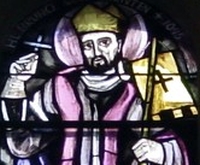 Died, 1045 in Persenbeug (Bösenburg, in modern Austria) when a building collapsed.
Died, 1045 in Persenbeug (Bösenburg, in modern Austria) when a building collapsed.Son of Duke Conrad of Carinthia and the Baroness Matilda. Nephew of Pope Gregory V. Cousin to emperor Conrad II, and later a counselor to him. Great-nephew of Saint Bruno of Querfort. Younger than average when ordained. Bishop of Wurzburg, Germany in 1033. Built the Cathedral of Saint Killian from his personal funds, and several parish churches in his diocese. Noted scholar and author, his best known work being a commentary on the Psalms. Peacemaker who ended the siege of Milan, Italy. Joined emperor Henry III on campaign against the Hungarians. Earned the popular title of Father of the poor through his charity.  Born: 1858, Lubien, Poland
Born: 1858, Lubien, PolandDied: 1941, Dzialdowo death camp, Poland Archbishop Antoni Julian Nowowiejski was was born in 1858, and beatified by Pope John Paul II on June 13, 1999, along with another 107 Poles who were martyred during World War II. The late archbishop of Plock, Poland, was arrested by the occupying Germans in 1940. He refused the chance to escape, saying he wouldn't desert his flock, and he also refused to profane Christian symbols. He died, after countless beatings, at the Nazi's Dzialdowo death camp in 1941. Blessed Antoni Julian Nowowiejsk, pray for us! 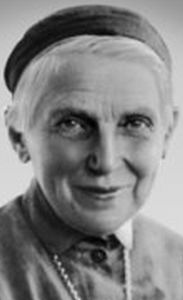 Born 1865-Austria
Born 1865-AustriaDied 1939-Rome, Italy Born Julia Maria Ledochowska, she was an Austrian-born religious leader. She became a Roman Catholic nun and founded the Congregation of the Ursulines of the Agonizing Heart of Jesus. She is a prominent member of the Ledochowska family. In 1886 she entered the novitiate of the Ursulines in Kraków and made her perpetual profession on 28 April 1889. In 1904 she was elected as the Mother Superior of the convent and remained in that position until 1907. In Kraków she opened a home for female college students, which at that time proved to be a new phenomenon. She often spent hours in Eucharistic Adoration. Because Roman Catholic institutions were illegal in the Russian Empire, she was forced to wear civilian clothes. Once the tsarist government oppression to the faith grew, she moved to the Russian-controlled Finland, where she translated songs and a catechism for the Finnish fishermen who were Protestants for the most part. The religious also set up a free clinic for ill people, as well as for the fishermen and their families. But her apostolic zeal soon attracted undue attention, for the Russians began to monitor her moves and decided that enough was enough. In 1914 she was expelled from the Russian Empire and sought refuge in neutral Sweden, though still kept in touch with the religious who remained in Russia. She was a noted orator who often called for and defended the right for Polish independence; she spoke in various forums and often addressed national leaders and fellow nobles from time to time. Ledóchowska settled in Stockholm and started a language school and a domestic science school for girls. In Denmark in 1918 she founded an orphanage and a school of home economics in Aalborg. In 1920 she returned to Poland with 40 other nuns who had joined her in her mission. With permission from Rome, she changed her independent convent into the Ursulines of the Agonizing Heart of Jesus which she founded in June 1920. It was in Poland that the apostolic nuncio Achille Ratti - future Pope Pius XI - encouraged and blessed her work. In May of 1939 she died in Rome in her convent at Via del Casaletto due to a carcinoma. The religious noticed that she had not come to the Vespers and so knocked on her door before finding her dead with a rosary in her hand. Her incorrupt remains were moved to the convent in Pniewy, Poland, on May 29, 1989. "Holiness does not demand anything great, beyond the ability of the person. It depends on God's Love; every daily act can be transformed into an act of love." -Saint Ursula St. Ursula, pray for us! 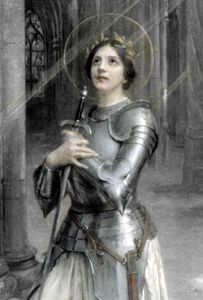 One of five children born to Jacques d'Arc and Isabelle Romee. Shepherdess. Mystic. From age 13 she received visions from Saint Margaret of Antioch, Saint Catherine of Alexandria, and Michael the Archangel.
One of five children born to Jacques d'Arc and Isabelle Romee. Shepherdess. Mystic. From age 13 she received visions from Saint Margaret of Antioch, Saint Catherine of Alexandria, and Michael the Archangel.In the early 15th century, England, in alliance with Burgundy, controlled most of what is modern France. In May 1428 Joan's visions told her to find the true king of France and help him reclaim his throne. She resisted for more than three years, but finally went to Charles VII in Chinon and told him of her visions. Carrying a banner that read "Jesus, Mary", she led troops from one battle to another. She was severely wounded, but her victories from February 23, 1429 to May 23, 1430 brought Charles VII to the throne. Captured by the Burgundians during the defense of Compiegne, she was sold to the English for 10 thousand francs. She was put on trial by an ecclesiastical court conducted by Pierre Cauchon, Bishop of Beauvais, a supporter of England, and she was executed on May 30, 1431 as a heretic. In 1456 her case was re-tried, and Joan was acquitted (23 years later). Joan was canonized as a saint of the Catholic Church on May 16, 1920 by Pope Benedict XV. "About Jesus Christ and the Church, I simply know they're just one thing, and we shouldn't complicate the matter." - Saint Joan of Arc, as recorded at her trial 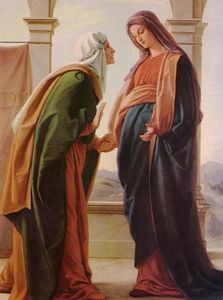 Like most feasts of Mary, it is closely connected with Jesus and his saving work. The more visible actors in the visitation drama (see Luke 1:39-45) are Mary and Elizabeth. However, Jesus and John the Baptist steal the scene in a hidden way. Jesus makes John leap with joy--the joy of messianic salvation. Elizabeth, in turn, is filled with the Holy Spirit and addresses words of praise to Mary--words that echo down through the ages.
Like most feasts of Mary, it is closely connected with Jesus and his saving work. The more visible actors in the visitation drama (see Luke 1:39-45) are Mary and Elizabeth. However, Jesus and John the Baptist steal the scene in a hidden way. Jesus makes John leap with joy--the joy of messianic salvation. Elizabeth, in turn, is filled with the Holy Spirit and addresses words of praise to Mary--words that echo down through the ages.It is helpful to recall that we do not have a journalist's account of this meeting. Rather, Luke, speaking for the Church, gives a prayerful poet's rendition of the scene. Elizabeth's praise of Mary as "the mother of my Lord" can be viewed as the earliest Church's devotion to Mary. As with all authentic devotion to Mary, Elizabeth's (the Church's) words first praise God for what God has done to Mary. Only secondly does she praise Mary for trusting God's words. Then comes the Magnificat (Luke 1:46-55). Here Mary herself (like the Church) traces all her greatness to God. Canticle of Mary.... My soul proclaims the greatness of the Lord, My Spirit rejoices in God my Savior For He has looked with favor on His lowly servant. From this day all generations will call me blessed: The Almighty has done great things for me, And holy is His Name. He has mercy on those who fear Him In every generation. He has shown the strength of His arm, He has scattered the proud in their conceit. He has cast down the mighty from their thrones, And has lifted up the lowly. He has filled the hungry with good things, And the rich He has sent away empty. He has come to the help of His servant Israel For He has remembered His promise of mercy, The promise He made to our fathers, To Abraham and his children for ever. Glory to the Father, and to the Son, and to the Holy Spirit. As it was in the beginning. is now, and will be forever. Amen. |




